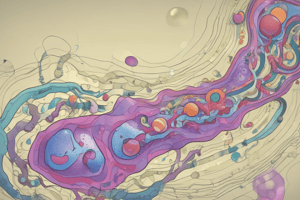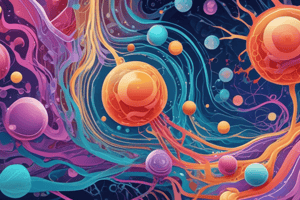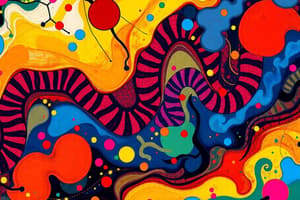Podcast
Questions and Answers
Which process involves the transport of fully folded proteins through nuclear pores?
Which process involves the transport of fully folded proteins through nuclear pores?
- Transmembrane translocation
- Gated transport (correct)
- Endocytosis
- Vesicular trafficking
In which type of transport are proteins unfolded to cross membranes?
In which type of transport are proteins unfolded to cross membranes?
- Transmembrane translocation (correct)
- Vesicular trafficking
- Exocytosis
- Gated transport
Which process is known as vesicular trafficking?
Which process is known as vesicular trafficking?
- Transport of proteins in membrane-bound vesicles (correct)
- Movement of proteins through nuclear pores
- Direct diffusion of proteins through the cytosol
- Transport of proteins across membranes in an unfolded state
What determines whether a protein remains in the cytosol or follows a particular transport path?
What determines whether a protein remains in the cytosol or follows a particular transport path?
Which cellular components are targeted by transmembrane translocation?
Which cellular components are targeted by transmembrane translocation?
What is the initial basis for sorting decisions of newly synthesized proteins?
What is the initial basis for sorting decisions of newly synthesized proteins?
Which additional modifications can influence the sorting of proteins synthesized on the rough endoplasmic reticulum?
Which additional modifications can influence the sorting of proteins synthesized on the rough endoplasmic reticulum?
Which transport mechanism involves synthesized proteins passing through nuclear pores?
Which transport mechanism involves synthesized proteins passing through nuclear pores?
Proteins are delivered to the nucleus through a process known as vesicular trafficking.
Proteins are delivered to the nucleus through a process known as vesicular trafficking.
In transmembrane translocation, polypeptide chains are unfolded to cross membranes.
In transmembrane translocation, polypeptide chains are unfolded to cross membranes.
The transport of proteins to mitochondria involves vesicular trafficking.
The transport of proteins to mitochondria involves vesicular trafficking.
The fate of a protein is determined by amino acid sequences known as targeting sequences.
The fate of a protein is determined by amino acid sequences known as targeting sequences.
Gated transport involves the movement of unfolded proteins through nuclear pores.
Gated transport involves the movement of unfolded proteins through nuclear pores.
Vesicles are small closed bags made of membrane that carry newly synthesized proteins between compartments.
Vesicles are small closed bags made of membrane that carry newly synthesized proteins between compartments.
Proteins synthesized on cytosolic ribosomes do not require unfolding for any type of transport.
Proteins synthesized on cytosolic ribosomes do not require unfolding for any type of transport.
Proteins synthesized on the rough endoplasmic reticulum can have additional sorting signals added in the form of sugars and phosphate groups.
Proteins synthesized on the rough endoplasmic reticulum can have additional sorting signals added in the form of sugars and phosphate groups.
Flashcards are hidden until you start studying
Study Notes
Protein Transport Mechanisms
- Proteins may fold into their final form as they are synthesized and then move through an aqueous medium to their final destination, remaining folded throughout.
- Delivery of proteins to the nucleus occurs through gated transport, where proteins are synthesized on cytosolic ribosomes and pass through nuclear pores into the nucleoplasm.
Transmembrane Translocation
- Transmembrane translocation involves the transport of unfolded polypeptide chains across one or more membranes to reach their final destination.
- Proteins destined for the interior of peroxisomes, mitochondria, and chloroplasts are synthesized on cytosolic ribosomes, may fold partially, and are then unfolded for transport across the membrane.
Vesicular Trafficking
- Vesicles, small closed bags of membrane, carry newly synthesized proteins from the endoplasmic reticulum to the Golgi apparatus and between other compartments.
- The fate of a protein, whether to remain in the cytosol or be transported via an alternative path, is determined by sorting signals within the protein itself.
Targeting Sequences
- Initial sorting decisions are made based on particular amino acid sequences called targeting sequences.
- For proteins synthesized on the rough endoplasmic reticulum, additional sorting signals such as sugars and phosphate groups can be added by enzymes that modify the protein's chemical structure.
Protein Transport Mechanisms
- Proteins may fold into their final form as they are synthesized and then move through an aqueous medium to their final destination, remaining folded throughout.
- Delivery of proteins to the nucleus occurs through gated transport, where proteins are synthesized on cytosolic ribosomes and pass through nuclear pores into the nucleoplasm.
Transmembrane Translocation
- Transmembrane translocation involves the transport of unfolded polypeptide chains across one or more membranes to reach their final destination.
- Proteins destined for the interior of peroxisomes, mitochondria, and chloroplasts are synthesized on cytosolic ribosomes, may fold partially, and are then unfolded for transport across the membrane.
Vesicular Trafficking
- Vesicles, small closed bags of membrane, carry newly synthesized proteins from the endoplasmic reticulum to the Golgi apparatus and between other compartments.
- The fate of a protein, whether to remain in the cytosol or be transported via an alternative path, is determined by sorting signals within the protein itself.
Targeting Sequences
- Initial sorting decisions are made based on particular amino acid sequences called targeting sequences.
- For proteins synthesized on the rough endoplasmic reticulum, additional sorting signals such as sugars and phosphate groups can be added by enzymes that modify the protein's chemical structure.
Studying That Suits You
Use AI to generate personalized quizzes and flashcards to suit your learning preferences.




